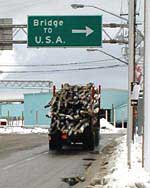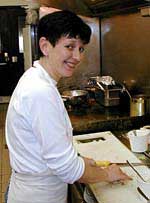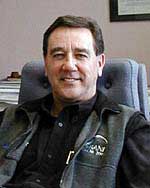By Tom Robertson
Minnesota Public Radio
December 17, 2001
|
| RealAudio |
The communities of International Falls, Minn., and Fort Frances, Ontario, have a casual, sister-city relationship. Though separated by the Rainy River and an international border, they share strong social and economic ties. They play on each other's sports teams and shop in each other's stores. There are many cross-border marriages. But things changed after Sept. 11. The friendships are still there, but tightened border security has slowed commerce and made some people reluctant to cross the border.
| |
|
|
|
||
Like their U.S. neighbors across the border, Fort Frances, Ontario residents were deeply affected by the events of Sept. 11.
Fort Frances resident Kim Bruyere is a cook at the town's popular Red Dog Inn. She's standing over a grill of sizzling bacon and pork chops.
"It makes me live life to the fullest. Every day, you live it to the fullest," says Bruyere. "You make sure you get things done...I can't let it stop me because there's a war going on."
Bruyere used to shop and visit restaurants in International Falls, but now she avoids crossing the border. In the weeks after the attacks, lines at the U.S. Customs station were one mile long, causing a one-hour to two-hour wait. Bruyere says the lines aren't as bad these days, but the thorough searches and questioning continue.
"It's too much of a hassle to get over there. Really, it's just a waste of time," she says. "But I'm not against it. A lot of my family does go over the border and it scares me when they're gone."
Out in the dining room of the Red Dog Inn, JoAnn Roach is enjoying her meal. She says there have been subtle changes for her since Sept. 11. Roach grew up in Fort Frances. She still crosses the border when she wants. But she says the increased security has made the two communities seem more separate.
"We played sports together, we have lots of friendships across the border. It wasn't like we were entering different countries. We just happened to be crossing the river, whether it was through a boat or a Ski-doo, it wasn't two countries," Roach says. "Now, we're coming to understand that there's definitely two countries going on. So the access isn't going to be as casual."
Roach says one new difference between the two communities is many Fort Frances residents question the U.S. military action in Afghanistan. Roach is one of them.
"My first word is arrogant," says Roach. "And now we're going to go in with all this aid. So I'm not real impressed with it. Like they're the big bad boys and they have to restore order in the world, I guess. And they did it very harshly."
| |
|
|
|
||
Across the room, John Stevens dines with co-workers. He manages Abzac, Inc., a Fort Frances manufacturer of paper cores for the paper mill industry. Stevens says he supports the U.S. war on terrorism.
"I think Canada is right behind the U.S., supporting them all the way," Stevens says. "I think it's a very good thing to do, to root out the terrorism, and stop this from happening again."
Frenchman Pierre Bornais is quality manager for Abzac's Canadian plants. He also supports the U.S.
"The world only to be free - terrorists is out, completely out. So I want to - I don't know how to say in French, 'kick their ass,'" he laughs.
Life in Fort Frances has changed in little ways for Town Administrator Bill Naturkach. He bowls on a 10-pin league in International Falls. Naturkach says he never knows when his car might be searched or he's held up for questioning, so he when he has to cross the border he always leaves a little early.
"I believe it's raised a height of awareness of concerns for border responsiblities in both directions, in terms of the casualness we've come to expect over living so close to the border," says Naturkach. "We cross the border in both directions for family reasons, business reasons, commerce reasons. And everybody is a little more careful in how they do that, and a little more concerned about the process in terms of the time it might take."
Naturkach says even more of a concern is the slowdown in trucking and commerce. Some $1.3 billion dollars a day in trade flows across the nations' shared 4,000 mile border. Naturkach says the heightened security is necessary, but it shouldn't hurt trade.
"There's a phenomenal amount of goods that cross that border, in both directions, that has to continue. And if it is held up improperly, it will do nothing but drive the price up of the vehicle that you buy, the house that you build - on both sides of the border.So there has to be a solution," says Naturkach.
| |
|
|
|
||
U.S. and Canadian officials are working together to strengthen border security while speeding up the flow of trade. The two countries have agreed to share more intelligence information. They'll also resume use of a computer system that eases the entry process into both countries for low-risk, pre-approved users. Fort Frances Administrator Bill Naturkach says he's glad to see the increased cooperation.
"I think it gave us a real big wake-up call, that we have to look after our back yard, whether it's Mexico, the United States or Canada. We are now part of the world. And the reality is, people are killing people out there and it's come home to wake us up," he says.
The young people in Fort Frances, Ontario are no less affected by the events of Sept. 11 than kids in the U.S. Fort Frances High School ninth-grader Jodie Caul remembers listening to events unfolding on the radio in her art class.
"And all of us were like, 'Oh my gosh!' And for once in our whole class, everybody was quiet listening to this," Caul says.
The kids say one of their favorite weekend activities is going to the movies. But the only movie theater in the area is across the border in International Falls. Ninth-grader Kate Basaraba says it's hard to get used to waiting in line at the border. She says Sept. 11 has affected all aspects of her life.
"It makes me double-think everything I do - crossing the border, going on planes, even just opening my mail makes me a little scared," Basaraba says. "Just going to the movies you're even like, 'Is there a plane going to hit here, or am I going to be okay crossing the border?' It definitely makes everybody a little more cautious about what they're doing and where they're going."
It's likely life on both sides of the Canadian border will continue to change. Earlier this month, the U.S. Justice Department announced the addition of helicoptors and more than 400 National Guard troops to ports of entry in a dozen states. And the Canadian Parliament is considering a proposal to spend more than $5 billion over five years for tougher security measures, and improved border facilities.



